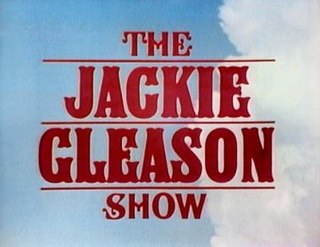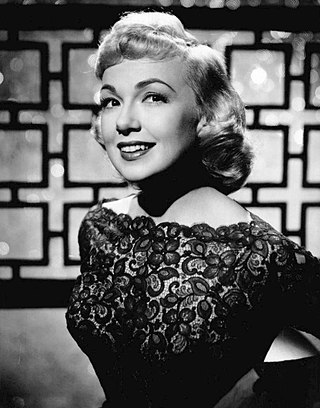Related Research Articles

The DuMont Television Network was one of America's pioneer commercial television networks, rivaling NBC and CBS for the distinction of being first overall in the United States. It was owned by Allen B. DuMont Laboratories, a television equipment and television set manufacturer, and began operation on April 13, 1940.

Ernest Edward Kovacs was an American comedian, actor, and writer.
The year 1956 in television involved some significant events. Below is a list of television-related events during 1956.
The year 1953 in television involved some significant events. Below is a list of television-related events during 1953.
The year 1952 in television involved some significant events. Below is a list of television-related events during 1952.
The year 1951 in television involved some significant events. Below is a list of television-related events during 1951.

Edward James Begley was an American actor of theatre, radio, film, and television. He won an Academy Award for Best Supporting Actor for his performance in the film Sweet Bird of Youth (1962) and appeared in such classics as 12 Angry Men (1957), Odds Against Tomorrow (1959) and The Unsinkable Molly Brown (1964). He was nominated for an Emmy Award for his portrayal of Matthew Harrison Brady in a television adaptation of Inherit the Wind. He is the father of actor and environmental activist Ed Begley Jr.

The Original Amateur Hour is an American radio and television program. The show was a continuation of Major Bowes Amateur Hour, which had been a radio staple from 1934 to 1945. Major Edward Bowes, the originator of the program and its master of ceremonies, left the show in 1945 and died the following year. He was ultimately succeeded by Ted Mack, when the show was brought into television in 1948.

The Ernie Kovacs Show is an American comedy show hosted by comedian Ernie Kovacs, first shown in Philadelphia during the early 1950s, then nationally. The show appeared in many versions and formats, including daytime, prime-time, late-night, talk show, comedy, and as a summer replacement series.

The Jackie Gleason Show is the name of a series of American network television shows that starred Jackie Gleason, which ran from 1952 to 1970, in various forms.

Edie Adams was an American comedian, actress, singer and businesswoman. She earned the Tony Award and was nominated for an Emmy Award.

Life Is Worth Living is an inspirational American television series which ran on the DuMont Television Network from February 12, 1952, to April 26, 1955, then on ABC until April 8, 1957, featuring the Archbishop Fulton J. Sheen. Similar series, also featuring Sheen, followed in 1958–1961 and 1961–1968.
The following is the 1958–59 network television schedule for the four major English language commercial broadcast networks in the United States. The schedule covers primetime hours from September 1958 through March 1959. The schedule is followed by a list per network of returning series, new series, and series cancelled after the 1957–58 season.
The following is the 1954–55 network television schedule for the four major English language commercial broadcast networks in the United States. The schedule covers primetime hours from September 1954 through March 1955. The schedule is followed by a list per network of returning series, new series, and series cancelled after the 1953–54 season.

Pantomime Quiz, initially titled Pantomime Quiz Time and later Stump the Stars, was an American television game show produced and hosted by Mike Stokey. Running from 1947—1959, it has the distinction of being one of the few television series—along with The Arthur Murray Party; Down You Go; The Ernie Kovacs Show, The Original Amateur Hour; and Tom Corbett, Space Cadet—to air on all four TV networks in the US during the Golden Age of Television.
The following is the 1951–52 network television schedule for the four major English language commercial broadcast networks in the United States. The schedule covers primetime hours from September 1951 through March 1952. The schedule is followed by a list per network of returning series, new series, and series cancelled after the 1950–51 season. This was the first television season of national network interconnection by coaxial cable and microwave, meaning programming could be transmitted live coast-to-coast if needed.
Time Will Tell is an early American game show that aired on the DuMont Television Network Fridays at 10:30 pm ET from August 27 to October 15, 1954. The host was Ernie Kovacs. Don Russell was the announcer, and Eddie Hatrak provided music.
Down You Go is an American television game show originally broadcast on the DuMont Television Network. The Emmy Award-nominated series ran from 1951 to 1956 as a prime time series primarily hosted by Dr. Bergen Evans. The program aired in eleven different timeslots during its five-year run.

The Frank Sinatra Show is an American television musical variety series hosted by Frank Sinatra from October 7, 1950, to April 1, 1952. The series aired on CBS on Saturdays the first season and on Tuesdays for the second year. As with many variety shows of the time, the show was broadcast live and was recorded via kinescope. Some episodes were 30 minutes long while others lasted for 60 minutes. At least one episode aired in a 45-minute time-slot.
Frank Bunetta was an American television director and producer.
References
- 1 2 3 4 Brooks, Tim; Marsh, Earle F. (2009). The Complete Directory to Prime Time Network and Cable TV Shows, 1946-Present. Random House Publishing Group. p. 779. ISBN 978-0-307-48320-1 . Retrieved February 10, 2022.
- 1 2 Bawden, James; Miller, Ron (2019). Conversations with Legendary Television Stars: Interviews from the First Fifty Years. University Press of Kentucky. ISBN 978-0-8131-7765-6 . Retrieved February 10, 2022.
- 1 2 McNeil, Alex (1996). Total Television: the Comprehensive Guide to Programming from 1948 to the Present (4th ed.). New York, New York: Penguin Books USA, Inc. p. 473. ISBN 0-14-02-4916-8.
- 1 2 3 Terrace, Vincent (2018). Encyclopedia of Unaired Television Pilots, 1945-2018. McFarland. p. 130. ISBN 978-1-4766-3349-7 . Retrieved February 10, 2022.
- ↑ Lohman, Sidney (October 12, 1952). "News of TV and Radio: All-Night Programming -- Other Studio Items" . The New York Times. p. X 11. Retrieved February 11, 2022.
- 1 2 "This Week (Cont'd)". Ross Reports. October 12, 1952. p. 2. Retrieved February 10, 2022.
- ↑ "CBS and NBC jolted by Sheen's Du Mont Stanza". Billboard. November 29, 1952. p. 4. Retrieved February 10, 2022.
- ↑ "Ernie Kovacs gets TV night program" . The New York Times. December 24, 1952. p. 22. Retrieved February 10, 2022.